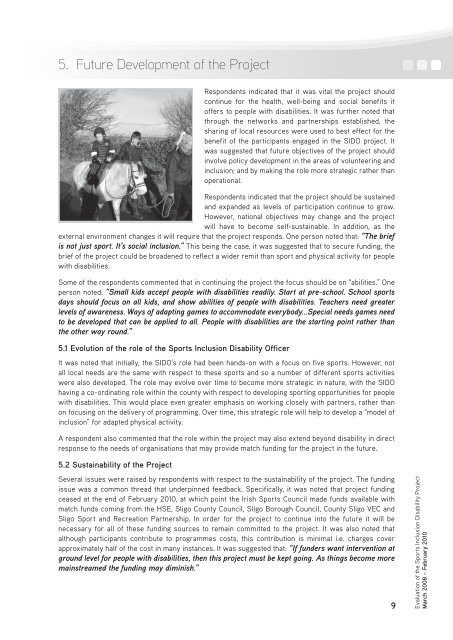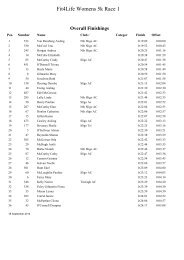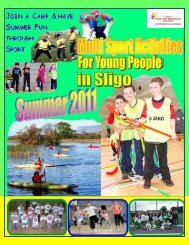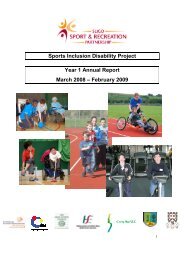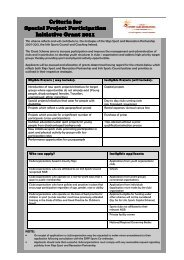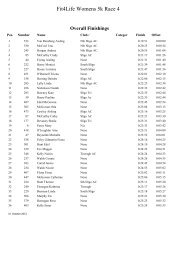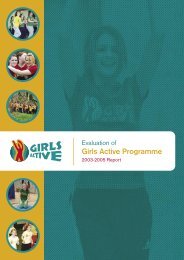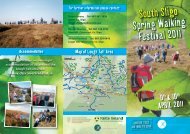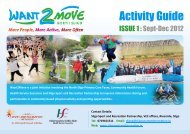SIDO Evaluation Executive Summary - Sligo Sport and Recreation ...
SIDO Evaluation Executive Summary - Sligo Sport and Recreation ...
SIDO Evaluation Executive Summary - Sligo Sport and Recreation ...
Create successful ePaper yourself
Turn your PDF publications into a flip-book with our unique Google optimized e-Paper software.
5. Future Development of the ProjectRespondents indicated that it was vital the project shouldcontinue for the health, well-being <strong>and</strong> social benefits itoffers to people with disabilities. It was further noted thatthrough the networks <strong>and</strong> partnerships established, thesharing of local resources were used to best effect for thebenefit of the participants engaged in the <strong>SIDO</strong> project. Itwas suggested that future objectives of the project shouldinvolve policy development in the areas of volunteering <strong>and</strong>inclusion; <strong>and</strong> by making the role more strategic rather thanoperational.Respondents indicated that the project should be sustained<strong>and</strong> exp<strong>and</strong>ed as levels of participation continue to grow.However, national objectives may change <strong>and</strong> the projectwill have to become self-sustainable. In addition, as theexternal environment changes it will require that the project responds. One person noted that: “The briefis not just sport. It’s social inclusion.” This being the case, it was suggested that to secure funding, thebrief of the project could be broadened to reflect a wider remit than sport <strong>and</strong> physical activity for peoplewith disabilities.Some of the respondents commented that in continuing the project the focus should be on “abilities.” Oneperson noted: “Small kids accept people with disabilities readily. Start at pre-school. School sportsdays should focus on all kids, <strong>and</strong> show abilities of people with disabilities. Teachers need greaterlevels of awareness. Ways of adapting games to accommodate everybody…Special needs games needto be developed that can be applied to all. People with disabilities are the starting point rather thanthe other way round.”5.1 Evolution of the role of the <strong>Sport</strong>s Inclusion Disability OfficerIt was noted that initially, the <strong>SIDO</strong>’s role had been h<strong>and</strong>s-on with a focus on five sports. However, notall local needs are the same with respect to these sports <strong>and</strong> so a number of different sports activitieswere also developed. The role may evolve over time to become more strategic in nature, with the <strong>SIDO</strong>having a co-ordinating role within the county with respect to developing sporting opportunities for peoplewith disabilities. This would place even greater emphasis on working closely with partners, rather thanon focusing on the delivery of programming. Over time, this strategic role will help to develop a “model ofinclusion” for adapted physical activity.A respondent also commented that the role within the project may also extend beyond disability in directresponse to the needs of organisations that may provide match funding for the project in the future.5.2 Sustainability of the ProjectSeveral issues were raised by respondents with respect to the sustainability of the project. The fundingissue was a common thread that underpinned feedback. Specifically, it was noted that project fundingceased at the end of February 2010, at which point the Irish <strong>Sport</strong>s Council made funds available withmatch funds coming from the HSE, <strong>Sligo</strong> County Council, <strong>Sligo</strong> Borough Council, County <strong>Sligo</strong> VEC <strong>and</strong><strong>Sligo</strong> <strong>Sport</strong> <strong>and</strong> <strong>Recreation</strong> Partnership. In order for the project to continue into the future it will benecessary for all of these funding sources to remain committed to the project. It was also noted thatalthough participants contribute to programmes costs, this contribution is minimal i.e. charges coverapproximately half of the cost in many instances. It was suggested that: “If funders want intervention atground level for people with disabilities, then this project must be kept going. As things become moremainstreamed the funding may diminish.”9<strong>Evaluation</strong> of the <strong>Sport</strong>s Inclusion Disability ProjectMarch 2008 – February 2010


